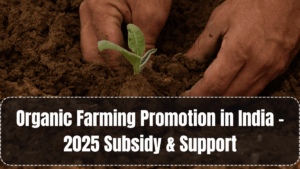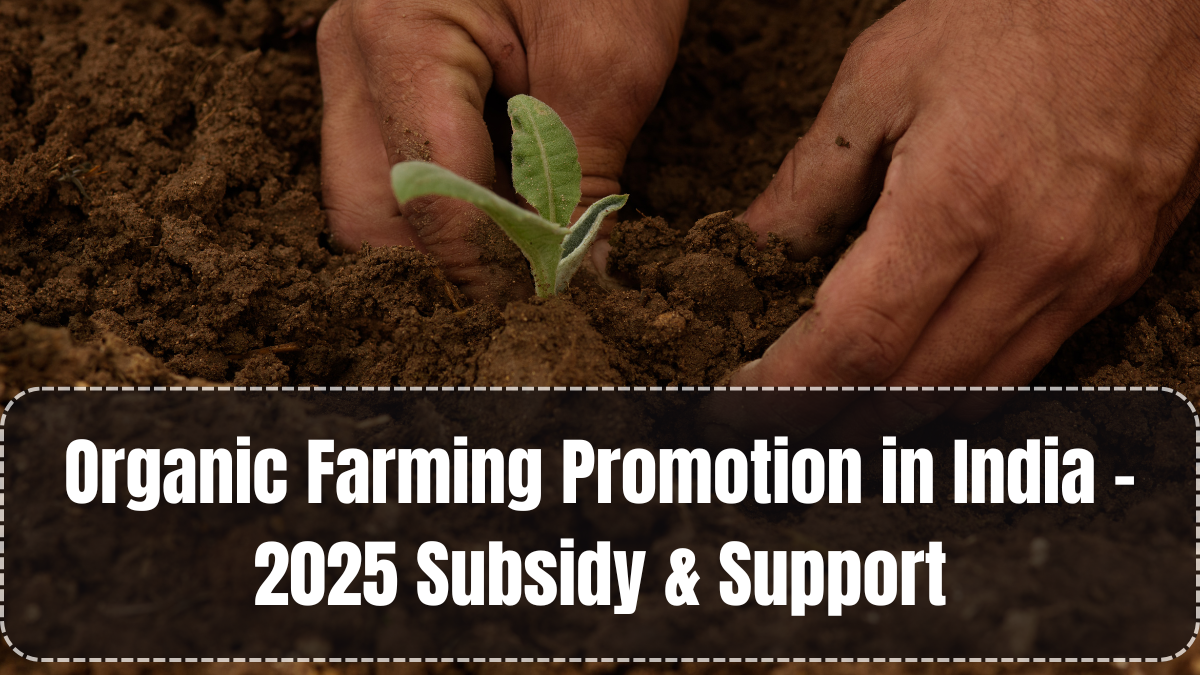With rising health awareness and global demand for chemical-free food, the India Organic Farming Push in 2025 has become a major pillar of the government’s agricultural strategy. Backed by fresh subsidies, digital tools, and training programs, this initiative is transforming traditional farms into sustainable, eco-friendly enterprises.
From seed banks to certification support, the Indian government is helping farmers reduce their dependence on chemical fertilizers and pesticides. Organic farming is no longer niche — it’s the future of Indian agriculture, and 2025 marks the strongest push yet.

Key Highlights of the 2025 Organic Farming Drive
The India Organic Farming Push comes with several robust incentives and program rollouts across states. Key highlights include:
-
100% subsidy on organic seed kits for small and marginal farmers
-
Up to ₹15,000 per hectare subsidy on organic inputs like bio-fertilizers and compost
-
Free training and certification through government-accredited bodies
-
eOrganic platform for accessing inputs, advisory services, and selling produce
-
Promotion of cluster-based farming for better logistics and branding
The mission is coordinated under the Paramparagat Krishi Vikas Yojana (PKVY) and National Mission on Organic Farming (NMOF).
Eligibility and Target Beneficiaries
The scheme is open to a wide range of farming groups and individual cultivators who wish to transition to organic practices. Those eligible under the India Organic Farming Push include:
-
Farmers owning up to 5 hectares of cultivable land
-
Self-help groups (SHGs) and farmer producer organizations (FPOs)
-
Tribal and backward region farmers prioritized for cluster programs
-
Farmers who commit to avoiding synthetic inputs and follow certification guidelines
Digital Kisan IDs and Aadhaar-linked bank accounts are required for subsidy disbursals.
Financial Support and Subsidy Structure
The financial model for the India Organic Farming Push provides comprehensive assistance for both input purchase and capacity building.
| Component | Subsidy/Support Provided |
|---|---|
| Organic Seed Kits | 100% cost coverage (up to ₹1,000 per farmer) |
| Bio-fertilizers & Manure | ₹15,000 per hectare subsidy |
| Certification Assistance | ₹5,000 per hectare for 3-year certification process |
| Organic Cluster Formation | ₹10 lakh per 50-acre cluster for training & logistics |
| Marketing Support | Assistance for branding, exhibition, and e-commerce sales |
This structure ensures affordability while making organic farming commercially viable.
Training and Digital Enablement
The India Organic Farming Push is also focused on educating farmers about organic methods and helping them access digital support:
-
Free training sessions on composting, pest control, and organic standards
-
Soil Health Card integration to monitor land suitability
-
Mobile advisory services through Kisan Suvidha and eOrganic app
-
Use of satellite tracking and blockchain for produce traceability and certification audits
Digital platforms simplify access to inputs, sell produce directly, and manage certification renewals.
Impact on Farmers and the Market
Thanks to the ongoing India Organic Farming Push, more than 1.2 million hectares of farmland have shifted to organic methods by mid-2025. Key outcomes include:
-
20–30% increase in farmer income from premium-priced organic produce
-
Entry into retail chains, export markets, and government procurement programs
-
Enhanced soil fertility, reduced water use, and biodiversity revival in several regions
-
Organic mandis and FPO tie-ups increasing farmer bargaining power
States like Sikkim, Kerala, and Maharashtra are leading with high conversion rates.
FAQs
Who is eligible for the organic farming subsidies?
Small and marginal farmers, SHGs, and FPOs with valid landholding documents and KYC are eligible under the 2025 program.
How much subsidy can I get for inputs?
Farmers can receive up to ₹15,000 per hectare annually for compost, bio-fertilizers, and other organic inputs.
Is certification mandatory for organic farming?
Yes, for availing full benefits and marketing as “organic,” certification from an accredited body is required.
Can I sell my organic produce online?
Yes, farmers can use the eOrganic platform and other FPO-led marketplaces to sell certified organic products.
What is the role of clusters in the scheme?
Clusters allow farmers to grow similar crops in a single region, helping with bulk production, certification, and market access.
Click here to know more.
